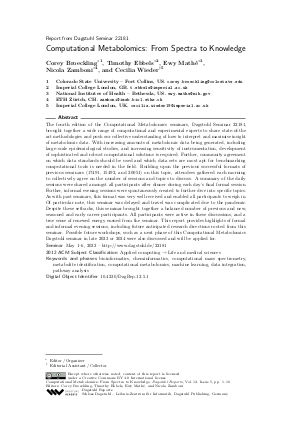Computational Metabolomics: From Spectra to Knowledge (Dagstuhl Seminar 22181)
Authors Corey Broeckling, Timothy Ebbels, Ewy Mathé, Nicola Zamboni, Cecilia Wieder and all authors of the abstracts in this report
-
Part of:
Issue:
Dagstuhl Reports, Volume 12, Issue 5
Part of: Volume: Dagstuhl Reports, Volume 12
Part of: Journal: Dagstuhl Reports (DagRep) - License:
 Creative Commons Attribution 4.0 International license
Creative Commons Attribution 4.0 International license
- Publication Date: 2022-12-08
File

PDF
DagRep.12.5.1.pdf
- Filesize: 2.13 MB
- 16 pages
Document Identifiers
Subject Classification
ACM Subject Classification
- Applied computing → Life and medical sciences
Keywords
- bioinformatics
- cheminformatics
- computational mass spectrometry
- metabolite identification
- computational metabolomics
- machine learning
- data integration
- pathway analysis
Metrics
- Access Statistics
-
Total Accesses (updated on a weekly basis)
0Document
0Metadata
Abstract
The fourth edition of the Computational Metabolomics seminars, Dagstuhl Seminar 22181, brought together a wide range of computational and experimental experts to share state-of-the art methodologies and push our collective understanding of how to interpret and maximise insight of metabolomic data. With increasing amounts of metabolomic data being generated, including large-scale epidemiological studies, and increasing sensitivity of instrumentation, development of sophisticated and robust computational solutions is required. Further, community agreement on which data standards should be used and which data sets are most apt for benchmarking computational tools is needed in the field. Building upon the previous successful formats of previous seminars (17491, 15492, and 20051) on this topic, attendees gathered each morning to collectively agree on the number of sessions and topics to discuss. A summary of the daily sessions were shared amongst all participants after dinner during each day’s final formal session. Further, informal evening sessions were spontaneously created to further dive into specific topics. As with past seminars, this format was very well received and enabled all participants to weigh in. Of particular note, this seminar was delayed and travel was complicated due to the pandemic. Despite these setbacks, this seminar brought together a balanced number of previous and new, seasoned and early career participants. All participants were active in these discussions, and a true sense of renewed energy ensued from the seminar. This report provides highlights of formal and informal evening sessions, including future anticipated research directions rooted from this seminar. Possible future workshops, such as a next phase of this Computational Metabolomics Dagstuhl seminar in late 2023 or 2024 were also discussed and will be applied for.
Cite As Get BibTex
Corey Broeckling, Timothy Ebbels, Ewy Mathé, Nicola Zamboni, and Cecilia Wieder. Computational Metabolomics: From Spectra to Knowledge (Dagstuhl Seminar 22181). In Dagstuhl Reports, Volume 12, Issue 5, pp. 1-16, Schloss Dagstuhl – Leibniz-Zentrum für Informatik (2022)
https://doi.org/10.4230/DagRep.12.5.1
BibTex
@Article{broeckling_et_al:DagRep.12.5.1,
author = {Broeckling, Corey and Ebbels, Timothy and Math\'{e}, Ewy and Zamboni, Nicola and Wieder, Cecilia},
title = {{Computational Metabolomics: From Spectra to Knowledge (Dagstuhl Seminar 22181)}},
pages = {1--16},
journal = {Dagstuhl Reports},
ISSN = {2192-5283},
year = {2022},
volume = {12},
number = {5},
editor = {Broeckling, Corey and Ebbels, Timothy and Math\'{e}, Ewy and Zamboni, Nicola and Wieder, Cecilia},
publisher = {Schloss Dagstuhl -- Leibniz-Zentrum f{\"u}r Informatik},
address = {Dagstuhl, Germany},
URL = {https://drops.dagstuhl.de/entities/document/10.4230/DagRep.12.5.1},
URN = {urn:nbn:de:0030-drops-174410},
doi = {10.4230/DagRep.12.5.1},
annote = {Keywords: bioinformatics, cheminformatics, computational mass spectrometry, metabolite identification, computational metabolomics, machine learning, data integration, pathway analysis}
}
